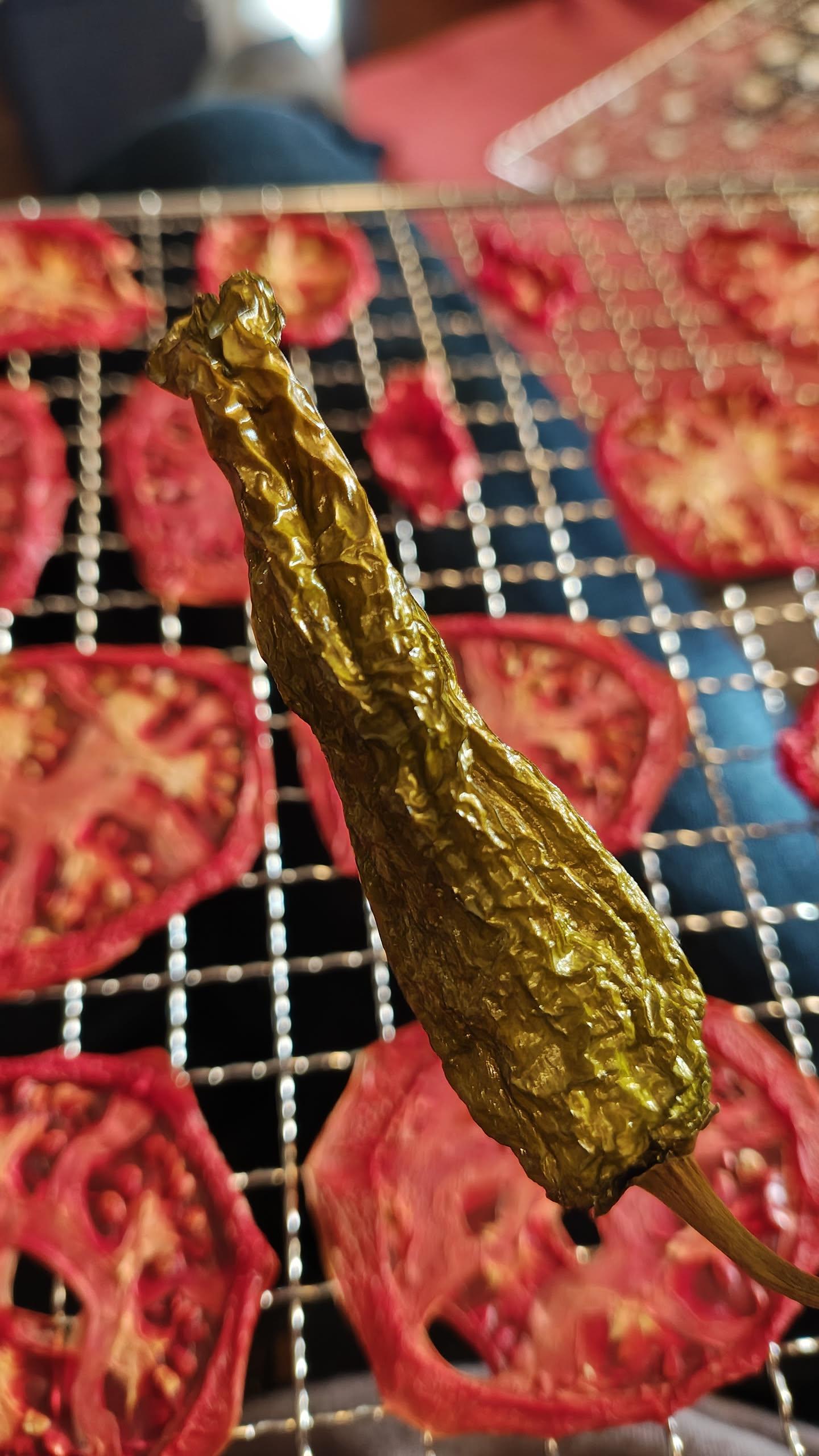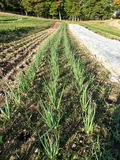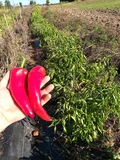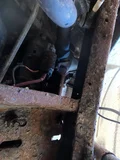TL;DR
We harvested scallions, sweet peppers, lettuce and potatoes. In the afternoon, we replaced a dump truck starter.
When It Rains, It Pours
Yesterday, the Ford GMC truck we sometimes use decided to not start while out in the dry fields. Bummer. This morning, the little John Deere Gator decided to stop working too. Double bummer. Oh, and the ball joints on the white Ford F-150 started to make clicking sounds. Triple bummer.
The good news is that a local mechanic was able to come out and diagnose the truck issues. The Gator was just serviced so the tech who did it will cover that for free. And the dump truck just needed a new starter which Jamie knew how to do, so we worked on that in the afternoon and got it fixed.
The ball joints will be repaired on Monday and the tech will look at the Gator next week too. Some days, everything happens all at once, but at least you know that on those days you’re getting all your bad luck out of the way at once.
Speaking of Scallions, They’re Back!
Earlier this week, I had to explain to someone what scallions were because they said that they like chives but don’t like onions and they didn’t know where scallions came from. I think this guy does a better job of it.
I said that scallions are like grown-up chives and synonymous with ‘green onion’ but that all of these things are alums anyway, just with more or less bulb to greens ratio. I said that probably what they don’t like in an onions is the pungency of the bulb, but that if they like the green stuff on top, they should keep a bag in the freezer for all of the onion bits they don’t use on a regular basis, then use them on a good soup making day later when the winter sets in. They liked that idea.
I like how quick and easy they are to grow, harvest, and use. I like that there’s a little green and a little white part to them. I like how they can liven up just about anything…plain rice, omelettes, soups, fish. Even a few blended into some salt and nutritional yeast for popcorn, scallions are fantastic.
I’m going to try to dehydrate some of the scallions from this week to see how they hold up. I tried radishes last week and they just tasted like vegetable fart. But the whole Shishito peppers I thought would take too long and darken out turned out fantastic, so you never know for sure if something will work until you experiment a few times.

AI Summary from Field Notes
Today’s LLM-driven summary got at least one very important suggestion right:
Gain hands-on experience with similar heavy-duty equipment
It’s great to be part of a farm crew where we are all given opportunities to get real-world experience and intentional training where it can fit in to the busy schedule. Just being human doesn’t mean you’re learning…and just because something ‘learns’ doesn’t make it human (e.g. AI). Human-to-human commitments and accountability are still the best way to drive personal growth and professional development.
As such, though I plan to continue my work on the RAG process I started last week, for the next 6 weeks I’ll be taking a Farm Business Planning course at New Entry Sustainable Farm Project, an Extension of Tufts University, in Beverly one night a week. It will make for long Tuesdays since I’ll be working on the farm in Ipswich the whole day, but it’s the additional homework I don’t know much about that will likely eat into my homelab and prototyping work.
Summary
Main Themes:
- Agricultural labor (harvesting, washing, packing, irrigation, animal care).
- Equipment maintenance (dump truck repair, tractor compatibility).
- Seasonal challenges (declining pepper/tomato yields).
- Skill development in farm machinery repair.
Activities Performed:
- Washed bins for scallion harvesting and packed peppers.
- Harvested scallions (110+ bunches) and peppers (red, matured, greenhouse).
- Repaired a 2003 Ford GMC dump truck starter (removed old part, used extensions, reinstalled new part).
- Chisel plowed potato rows (with Jamie).
- Loaded delivery orders, washed lettuce/basil, and watered chickens/pigs.
New Things Encountered:
- Repairing a heavy-duty dump truck starter (specifically a 2003 Ford GMC).
- Dealing with proprietary modern tractors (difficult to repair without certification).
- Complexity of modern machinery compared to older, user-friendly equipment.
Questions & Future Research:
- How to repair/upgrade modern proprietary tractors without certification?
- What are the differences in maintenance between old and new agricultural equipment?
- How to learn advanced machinery repair (dump trucks, tractors) for farm use?
- What training/resources exist for farm machinery maintenance?
Suggestions:
- Enroll in certification courses for modern tractor repair.
- Gain hands-on experience with similar heavy-duty equipment.
- Study technical specs of modern machinery for compatibility and repair.
- Document repair processes (e.g., dump truck starter replacement).
- Collaborate with experienced mechanics or farm technicians for guidance.
Part 1
Main Themes:
- Agricultural work (harvesting, washing, packing, irrigation, animal care).
- Equipment maintenance (dump truck starter repair, tractor compatibility).
- Seasonal challenges (declining yields for peppers/tomatoes).
- Skill development in farm machinery repair.
Activities Performed:
- Washed bins for scallion harvesting.
- Harvested scallions (110+ bunches) and peppers (red, matured, outside and greenhouse).
- Washed, packed, and stored harvested peppers.
- Repaired a dump truck starter (2003 Ford GMC) after it failed.
- Removed old starter, struggled with a hard-to-reach bolt, used ratchet extensions, and reinstalled the new starter.
- Chisel plowed potato rows (with Jamie).
- Loaded delivery orders and washed lettuce/basil.
- Watered chickens and pigs.
New Things Not Yet Encountered:
- Repairing a heavy-duty dump truck starter (specifically a 2003 Ford GMC converted to a dump truck).
- Dealing with proprietary modern tractors (difficult to repair without certification).
- The technical complexity of modern agricultural machinery compared to older, rugged, and user-friendly equipment.
Questions and Future Research Areas:
- How to effectively repair/upgrade modern proprietary tractors without certification?
- What are the differences in maintenance requirements between old and new agricultural equipment?
- How to learn advanced machinery repair (e.g., dump trucks, tractors) for long-term farm use.
- What resources or training programs are available for farm machinery maintenance?
Suggestions:
- Enroll in a certification course or workshop for modern tractor maintenance.
- Practice on similar heavy-duty equipment (e.g., dump trucks, tractors) to build hands-on experience.
- Research the technical specifications of modern agricultural machinery to understand compatibility and repair processes.
- Document repair steps for future reference (e.g., dump truck starter replacement).
- Collaborate with experienced mechanics or farm technicians for guidance on proprietary equipment.
[end of post]
Enjoy Reading This Article?
Here are some more articles you might like to read next:









